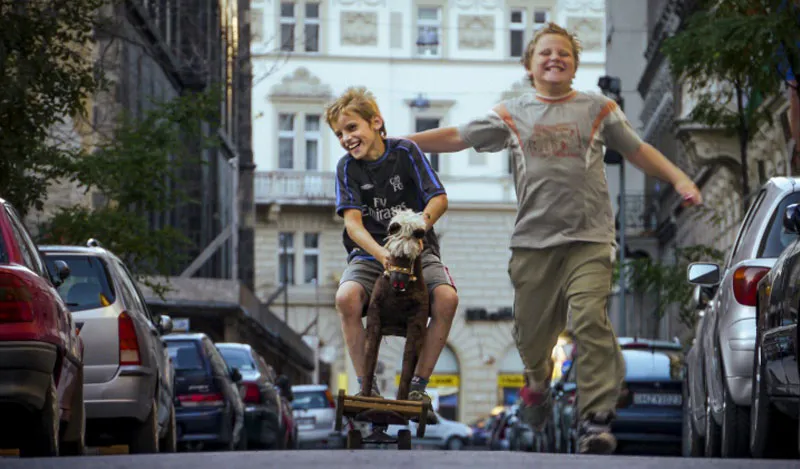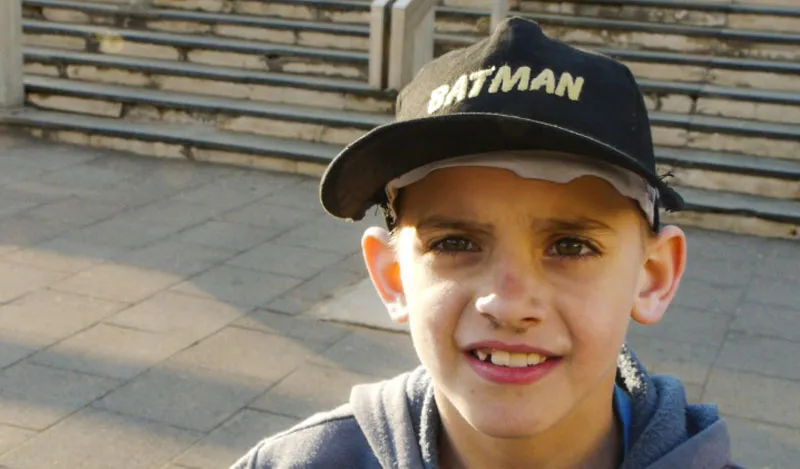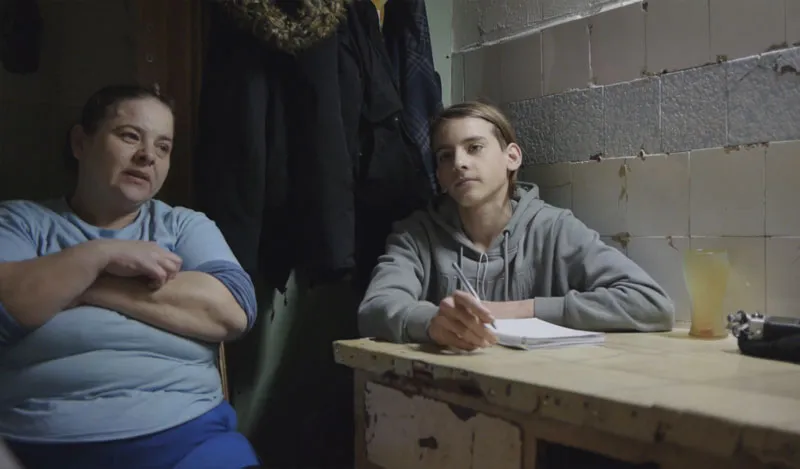We are immersed in the life of Sanyi, a lively boy growing up in Hungary. The documentary Kix follows him over the course of twelve years, from his spirited eight-year-old self to where his path leads on the cusp of adulthood. Filmed with a mix of handheld intimacy and more polished aesthetics, it provides a uniquely personal view into one boy’s journey set against the changing backdrop of his nation.
From the very beginning, Sanyi strikes us as playfully rebellious. Whether tag-teaming with his brother to skateboard around the city streets and stir up harmless mischief or cultivating a mischievous alter-ego, he approaches each day with irrepressible energy and confidence in his own abilities. It’s easy to see why filmmaker David Mikulan becomes enthralled with chronicling Sanyi’s colorful world.
As the years progress, however, reality begins to encroach on Sanyi’s freedom. We come to better understand the challenges of his family life, the pressures bearing down, and how his actions now carry new consequences. The transformation unfolding is both vividly human and uniquely Hungarian. Having earned acclaim on the international film circuit, Kix artfully crafted our individual stories into the broader sweep of history. What challenges and changes might Sanyi still face as he steps into adulthood? His journey has only begun.
The Spirit of Sanyi
From the moment we meet him, it’s clear young Sanyi marches to the beat of his own drum. Whether skateboarding fearlessly through the city streets or cultivating his dual identities of classroom angel and rebellious alter-ego, this boy embraces life with an infectious zest. But behind the swagger, his difficult home life hints at why he’s often found raising havoc outside.
Sanyi lives cramped with his family in a tiny apartment, his overworked mother holding down three jobs just to keep a roof over their heads. With his father often absent, he seems to raise himself much of the time. Yet for all the troubles, Sanyi’s jubilant energy never seems to burn out. He befriends filmmaker Mikulan, bonding over their adventurous spirits, and finds an encouraging guide in the man.
As years pass, Sanyi evolves from a toothless trickster into a wiry preteen. By now, a new sister and changed friends have joined the household. But much remains the same: Sanyi continues to test boundaries and find outlets for his bold character. The consequences of his teenage exploits bring greater stakes, however, and the first cracks begin to show in his once-defiant smile.
Throughout his passage into adulthood, Sanyi’s charming, freedom-loving soul stays true to itself. But the pressures bearing in from all sides increasingly threaten to overwhelm the spirit that once soared too high to fall. The battles this vibrant boy must now face alone seem poised to define the man he will become.
Capturing Life’s Motion
Kix presents a dynamic visual journey as it captures Sanyi’s story over years. In early scenes, director Mikulan adopts gritty handheld camerawork that hurtles through the streets much like the boys he films. This raw energy immerses us in their exhilarating adventures. However rough, these shots convey life’s vivid spontaneity through youthful eyes.
As Sanyi reaches adolescence, the style changes too. Scenes become composed with steadier framing, keeping subjects in clearer focus. This refinement mirrors how responsibilities emerge during teenage times. Yet compassionate close-ups still allow Sanyi’s soulful expressions to shine through even as he braves new hardships alone.
Certain moments leave a lasting impression, like the poetic slow motion of a youthful plunge into cool waters. Here the audience briefly glides within the character’s carefree spirit. Impactful editing also strengthens how we perceive his journey’s escalating stakes.
Throughout changing techniques, an intimate immersion remains core to Kix’s power. By witnessing life through constantly evolving lenses, we experience how circumstance and identity shape one boy across a lifetime. Masterful cinematography grants permission for viewers too to perceive the world and ourselves in vivid new light.
Universal Themes Among the Personal
Kix touches on several thought-provoking ideas that give the film resonance. A core theme sees Sanyi coming of age and confronting how childhood freedom faces reality’s consequences as an adult world approaches. Through it all, his spirited character remains true while pressures intensify from every direction.
Sanyi’s family struggles also raise commentary on social issues like economic hardship. We understand the boy’s restless behavior stems partly from tight circumstances out of his control. His story puts a relatable face to statistics and brings policy discussions to an individual level.
Even the shifting political climate features prominently, seen through impacts on Sanyi and reactions we glimpse. The film traces macro changes through one micro life, personalizing broader topics.
Directors tell Sanyi’s story with care, sympathy, and subtlety. We feel invested in his journey while left to ponder themes for ourselves. Though situations differ, viewers worldwide may find parallels to their own journey from innocence to responsibility.
By addressing universal human experiences through a distinctly Hungarian lens, Kix finds pathways for personal stories to transcend borders. Its ability to provoke thought on social and emotional levels grants the film a contemporary message alongside its timeless portraits of growth.
A Film That Stays With the Heart
Kix does not simply depict Sanyi’s journey; it makes the audience live through every moment. Director Mikulan helms the film with deep care and nuanced skill, drawing powerful emotion from each scene.
On a technical level, rhythmic cutting and a stirring score set the stage for viewers to feel what’s unfolding. But what truly leaves an impression is how we form a real connection with the spirited boy at the center of it all. His wit and charm in younger years give way to palpable struggles as reality sets in.
Through it all, Kix finds moments of gravity and levity with equal poise. Laughter emerges from Sanyi’s youthful adventures, yet the moving portraits of his difficult family life and impending adulthood are just as thought-provoking. By showcasing life’s complexity, neither issue nor person feels reduced in the telling.
Even after the credits roll, this stays with you—not as a collection of images but as a memory of a relationship formed with its subject. Kix shows how skillfully directing life’s joys and sorrows can leave a lasting impact far beyond any single viewing. Its emotional resonance is a testament to one boy’s journey truly witnessed and shared.
Finding Common Ground and Carving New Paths
While watching Sanyi’s story unfold over years in Kix, it’s natural to reflect on other films that have similarly ambitious scopes. Richard Linklater’s Boyhood stands out as a compatible watch, chronicling one American young man’s journey from little league to high school graduation.
Both capture childhood’s ephemeral magic, along with how responsibilities and relationships evolve vivily with time’s passage. Yet Kix enriches the experience in its own ways. Viewers are given a uniquely Hungarian cultural lens and confronted with very real social issues less directly addressed elsewhere.
Perhaps most striking is how Kix prioritizes no easy resolutions. It honors complexity and leaves contemplation open-ended. Where some coming-of-age movies offer closure, this one poses questions that continue finding new relevance.
By building upon foundations laid by comparable works while carving its own path, Kix stimulates analysis on a deeper level. It finds avenues for personal stories to comment meaningfully on societal contexts and draw parallels to our shared human experience across borders.
In doing so, Sanyi’s story gains staying power, sure to outlive any single viewing. His journey transports audiences and gives food for thought that lasts far beyond the final scene.
A Journey Worth Sharing
Kix takes audiences on a moving adventure through one boy’s richly depicted coming of age. Over its duration, we’ve given witness to Sanyi’s spirited childhood, the evolving challenges of his teenage years, and the responsibilities that come with him stepping towards adulthood.
Director Mikulan presents his subject’s life with empathy and craft, shedding light on both the lighthearted moments of youth and greater hardships that come with time. Throughout, Sanyi’s story remains an endearing reminder of life’s complexity and the universal human experiences we all share.
By setting an individual’s passage against the backdrop of Hungarian society, Kix also finds broader commentary. It leaves us pondering how personal narratives intersect with, and are shaped by, the communities and history that surround us.
In following Sanyi for twelve years, this film truly transports us. Though his journey is not yet complete, the pieces of his path captured here have stayed with this audience long after the final scenes. Kix is a story worth remembering, a testament to both the art of documentary storytelling and one boy’s impactful life. Sanyi’s spirit continues to inspire.
The Review
Kix
Kix is an intimate yet deeply impactful documentary that follows its subject's coming of age with empathy, humility, and nuance. By crafting a personal glimpse into Sanyi's vivid journey set against real-world contexts, it finds commentary on shared human experiences that lingers long after viewing. Director Mikulan's care and craftsmanship and the film's ability to transport audiences across borders through one inspiring life story make Kix a memorable and meaningful watch.
PROS
- Intimately follows its subject over 12 years to truly depict his journey and development.
- Sympathetically portrays Sanyi's character and hardships without simplifying his experiences
- Highlights universal themes like growing up through a uniquely personal lens
- Compelling mix of filmmaking styles that evolve along with its changing subject
- Provides thoughtful commentary on intersecting personal/social/political issues
CONS
- Minimal resolution or closure at the end may be dissatisfying for some.
- Heavy subject matter may be emotionally taxing at times.
- The cultural/economic context of Hungary may not resonate as strongly for international audiences.





















































Discussion about this post